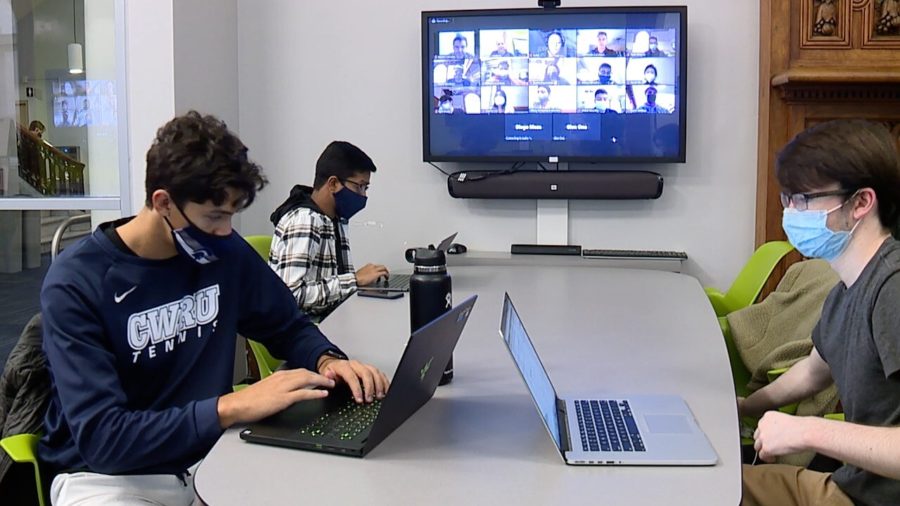In-person vs. online classes: which are better?
We weigh the pros and cons of in-person vs. online classes so you don’t have to.
February 4, 2022
The week of Jan. 24, Case Western Reserve University students saw the return of in-person classes. Many students welcomed this step in the direction of normalcy. But for some, the allure of attending online Zoom classes in pajamas from the warmth of their dorm rooms put a damper on the excitement. There are clear mixed feelings among CWRU students between learning online versus in-person.
Now to the real question: is either form of learning superior to the other? Or is it merely a personal preference? I hope to provide an honest and unbiased “review” of the two types of learning, with the goal of encouraging students to see both the positive and negative aspects of both mediums.
Seeing as we began the semester with online learning, it seems logical to discuss this novel and controversial form of learning first.
Pros – Online classes
Increased flexibility
The increased workability of our jam-packed student schedules is arguably the most appealing attribute of online classes. With lectures recorded and no time wasted walking to Case Quad, students have a much easier time fitting in their hobbies and sports practices or even just hanging out with friends.
Increased class engagement
A rather shocking advantage to online classes that we all discovered during the shift to Zoom was the greater number of questions that came from students. This was, at least in part, due to the removal of the intimidation of raising your hand in front of your peers, with the Zoom chat now a compelling option. Instead of having 350 students all staring up at you, expecting a profound statement, one can ask any question they want without fear of judgement. Being behind a screen brought forward a plethora of students who just needed that little extra push.
Focused environment
For lots of students, sitting amongst hundreds of peers for over an hour is akin to a nightmare when it comes to focusing and being productive. Concentrating on organic chemistry is quite challenging when the people behind you are trying to resolve a long debate about which shoes they should buy or are discussing what the best Saturday night plans are. Online learning provides an escape from these annoyances, and many students welcome it with open arms.
Cons – Online classes
Procrastination
An insurmountable beast for most students, procrastination rears its ugly head especially when the classroom is replaced with the dorm room. Indirect or direct motivation from being around fellow students is taken for granted until online classes take it away. How can we be expected to motivate ourselves when we don’t have that support?
Demand for independence and self-motivation
The need to actually manage oneself is the most devastating aspect of online school. In the absence of face-to-face interactions with professors and peers, students are cast off to fend for themselves in the treacherous sea of Canvas, with the dreaded “To Do” list as their only company. It is up to us to make schedules and eliminate distractions such as the glorious and seductive Netflix.
Isolation
Some would consider this a pro of online learning when it comes to the current public health situation of COVID-19, but socially, isolation is a major con. Unless one works hard to actively make plans with friends, attend club meetings and go to sports practices, social interaction is hard to come by. Even if you manage to make it to a previously populated study spot, no one seems to be there to keep you company.
As you can see, there are clear positives and negatives to online learning that make both sides of the argument strong ones. But what about in-person classes? Are they as amazing as students make them out to be when complaining about learning through Zoom?
Pros – In-person classes
Social interaction
This seems like an obvious point. However, spending time with others genuinely is one of the most appealing aspects of in-person learning. Going to class and seeing people outside of your close-knit group is essential to your mental health and well-being. Learning amongst your peers makes the college experience exponentially more fulfilling than sitting alone in your dorm room.
Higher-quality education
Based on my observations around campus, an extensive amount of students feel very strongly about this one. For some classes, there is not much of a difference in the delivery or type of information delivered, whether it be over Zoom or in a lecture hall. But for classes such as labs, discussion-based seminars and other hands-on courses, being in person is essential. Students will simply not get the same quality of learning when, for example, attending a virtual lab.
Fewer distractions
Categorizing increased focus with more social interaction might sound silly. Surely, being around more people would be more distracting? This is simply not true. Being surrounded by other people who are studying and paying attention can have a facilitating and motivating effect, making you more likely to join in those activities.
Cons – In-person classes
COVID-19
COVID is a big one, obviously. Daily gatherings of hundreds of students who frequently remove their masks to eat or sip some water is risky business during these times. Wouldn’t it just be safer for all of us to remain online? Are the pros of in-person learning worth the risk? Well CWRU made its decision to bring us back in-person anyways, but whether they were justified is up to you to decide.
Getting to class
Living in Cleveland makes all of us bitterly aware of the term “lake-effect snow.” The wind and slippery sidewalks make walking to class a liability. To make matters worse, every single member of the first-year class seems to be trying to get on the shuttle the moment that you decide to try your luck. In the current situation, we have to strategically plan our choice of shuttle stop if we are to have any chance of getting to class without braving the harsh conditions.
After all of that, what is the answer? Which is better? In short, neither. The purpose of this article is to encourage students to adopt logical and rational thinking in terms of their feelings towards the two types of learning. Keeping an open mind during these times is the most fruitful way to be as conditions keep changing. Use this article to remind yourself that despite any strong feelings you have towards online or in-person learning, neither is perfect—both are good and bad in their own ways. Think rationally, and no matter the form of learning, you will succeed. Remember what this time has taught us. As Max McKeown said, “all failure is failure to adapt, all success is successful adaptation.”




